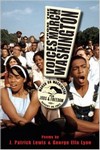When I was in university in England, two events had a big impact on all of us students. We watched the Berlin wall come down, and we saw Nelson Mandela being released from prison. Many of us demonstrated outside the South African embassy in London (including me) calling out for the the South African government to release all political prisoners. All of us grew up in the shadow of the Cold War and it was extraordinary to see the wall come down, knowing that this was the beginning of a new era.
For many young people growing up in the United States during the 50's and 60's, the events associated with the civil rights movement changed their lives. Today's poetry title tells the story of the March on Washington through the eyes of these young people.
Voices from the march on Washington
Poetry
For ages 11 and up
Boyds Mills Press, 2014, 978-1-62091-785-5
Many of us live in places where people of different
races, religions, and cultural backgrounds live together. We embrace the fact
that our streets, restaurants, schools, offices, and other places are full of
people who are from different racial and ethnic backgrounds. We recognize that
diversity makes our towns and cities richer. This was not always the case. For
decades most of the south and some places in the northern parts of the United
States were strictly segregated. African Americans could not use the same
schools and other public places that white people used. They could not go to
swimming pools, could not eat in restaurants, and had to sit at the back in
buses. They were second class citizens.
Then a movement,
put into motion by Martin Luther King Jr. and his followers, began to bring
about change. In 1955 Rosa Parks refused to give up her seat on a bus, and the
Montgomery Bus Boycott began. By 1963 the civil rights movement had begun to
unravel the Jim Crow laws, and on Wednesday August 28 of that year thousands of
people gathered on the Mall in Washington, D.C. for the March on Washington.
What would it
have been like to be a part of this historic event? What would it have been
like to organize it? In this remarkable book of poetry we meet some people who
went to the march, who worked hard to make it a success. Some of people we
encounter are fictional, while others were really present on that day.
One of the first
people we meet is Myrtle Hill, a school teacher, who experiences fear when
stones are thrown at the bus she is travelling in from Baltimore, Maryland, to
Washington, D.C. A window is broken and passengers scream. People dive for the
floor of the bus, and then one of the women starts to sing. Soon more voices
join hers and thus the people throw songs at the people who threw rocks.
Soon after, we
meet Annie Ross, a nineteen year old college student from Georgia who went to
Washington. Sixteen year old Dan Cantrell is also from Georgia, and he goes to
the march even though his father tells him not to. Raymond Jarvis also comes
from the south. He is from Texas and has suffered at the hands of white
supremacists. Ruby May Hollingsworth is
only six years old, but she and her family travel all the way from Arkansas.
Ruby does not really understand what is going on, but when she is allowed to
drink from the same water fountain as a white girl she begins to realize that
something important is happening around her.
Emma Wallace
travels all the way from a farm in Iowa. She wants to be a part of history, to
see what is happening in her country for herself. She is encouraged by her father to see the
“national powwow” and perhaps witness the event that will “shame the past / and
shape the future.” Renee Newsome, who lives in Washington D.C also has a father
who encourages her to be a part of the march, and she goes to the Mall with him
and her grandmother.
The stories of
these six characters are told in a series of poems, and we are able to see what
being on the march meant to them all, how it changed their lives in meaningful
ways. We also hear the voices of other people, people like the singer Lena
Horne, Coretta Scott King and Charlie Jackson, who was a policeman.
The voices that
speak to us from the pages of this book bring the March on Washington to life,
helping us to experience this extraordinary time in a personal and powerful
way. We come to understand why this event meant so much to so many, and we give
thanks that its impact is still being felt today.

No comments:
Post a Comment